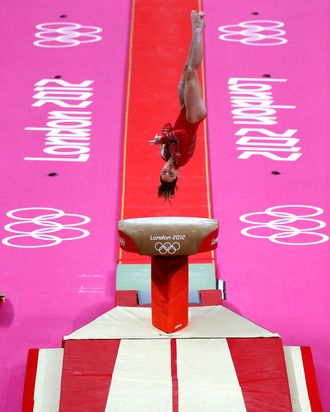
The artistic gymnastics events at the 2012 Olympics are all complete, and this year’s Games taught us a number of lessons. Here, now, a breakdown of what we learned about the state of the sport from the London Games.
Life isn’t fair, and neither are the Olympics.
These Olympics seemed to be more about the rules than the gymnastics. It started with Jordyn Wieber qualifying with the fourth-highest score and being denied a spot in the all-around final because of the “two per country” rule put in place in 2004. The rule has cut out many a great gymnast before, but never the current world champion and the most publicly visible athlete leading up to the Games. What seemed like just an annoyance was exposed as a potentially major problem for the sport.
Meanwhile, “tie break” and “inquiry” stole the show. Inquiries into athlete’s difficulty scores changed the game in London while creating many tense, drawn out moments. Almost all of the tie breaks ended up all being for third place, cruelly leaving one athlete with a medal and the other empty handed. Team Ukraine, Aly Raisman, Catalina Ponor, and Vanessa Ferrari all ended up missing out on medals because of inquiries and tie-breaking procedures. While the ability to inquire about difficulty scores is good for athletes, if the judges can’t even get the scores right, how is the casual viewer supposed to feel? The tie-breaking rules were also confusing for viewers and officially wore out their welcome by the end of the Games. The Olympics, by the way, are the only competition for gymnastics that doesn’t allow ties.
Worst use of the tie break: After six years of injuries and no medals in Beijing, 2006 World Champion Vanessa Ferarri, now in her twenties, finally appeared to win bronze on floor … until Aliya Mustafina posted the same score and won the tiebreak. Ferarri would leave empty handed again.
You can’t predict gymnastics.
London proved to be anything but predictable, even prompting commentator Shannon Miller to say, “I’m afraid to guess anymore,” when asked who she thought would take the high-bar title. Outside of the U.S. women winning their expected gold, these Games had major upsets, unexpected spoilers, and down-to-the-wire finishes, making it one of the most exciting in years. It was one of the deepest competitions since the implementation of the open-ended scoring system nearly seven years ago, which, early on, resulted in mistake-laden performances and lots of falls as athletes adjusted to the difficulty. The solid performances in London don’t just make for better entertainment — they show the progress in the new code of points. Athletes are doing a better job executing more difficult routines, and the judges are better rewarding the execution. There’s still a ways to go in getting the perfect difficulty/execution scoring balance, but the athletes rose to the occasion and brought their best to London.
Biggest upsets : Sandra Izbaşa topping McKayla Maroney for vault gold, and Brazilian Arthur Zanetti dethroning China’s Chen Yibing on still rings.
It’s not how you start. It’s how you finish.
The U.S. men soared to the lead after qualification as China and Japan unraveled. It didn’t matter. When the scores were erased to zero in the team final, a mostly young, inexperienced American team fell to pieces and China and Japan finished 1-2.
Gabrielle Douglas began her senior career last year with four falls at the national championships. Douglas kept proving her doubters wrong, and she finishes up in London as the 2012 Olympic all-around champion.
At the beginning of the Games, Alexandra Raisman was simply the dependable captain of team USA (though, we will take credit for naming her the sleeper). Raisman went from fourth in the all-around to third on beam and then emerged with a golden finish on the floor to become the most decorated American gymnast of these Games. Proving mental toughness is still the great separator of talent at the Olympics.
Best finishes: One year after a complete ACL tear, Russia’s Aliya Mustafina earned four medals, the most for any gymnast, outdoing her more publicly hyped teammate Viktoria Komova. Danell Leyva, meanwhile, staged an epic comeback in the men’s all-around to earn bronze — the one and only medal for the American men.
The Olympics mean hellos and good-byes.
These Games were the final performance of some of the all-time greats, but we also learned a lot about the next generation in London.
Oksana Chusovitina vaulted in her sixth and final Olympics at the age of 37. She leaves behind Janine Berger as Germany’s next star vaulter.
Twenty-four-year-old Romanian Catalina Ponor, a three-time Olympic champion in 2004, goes out with a team bronze and an individual silver on floor. Larisa Iordache struggled through injury in London but is expected be the face of Romanian gymnastics leading to Rio.
Beth Tweddle, 27, is a three-time Olympian and the best gymnast in British history, and she finally got the medal she was waiting for with a bronze on bars. She leaves behind a now-thriving program she helped put on the map — one that includes a young all-around hot shot in Rebecca Tunney.
Jordan Jovtchev wrapped up his sixth Olympic Games. Now he looks to help build his country’s team as the president of the Bulgarian Gymnastics Feredration.
Best grand entrance: McKayla Maroney’s perfect vault in team finals. Hello, world.
Lindsey Green is writing about Olympic gymnastics for The Sports Section. You can e-mail her at [email protected].